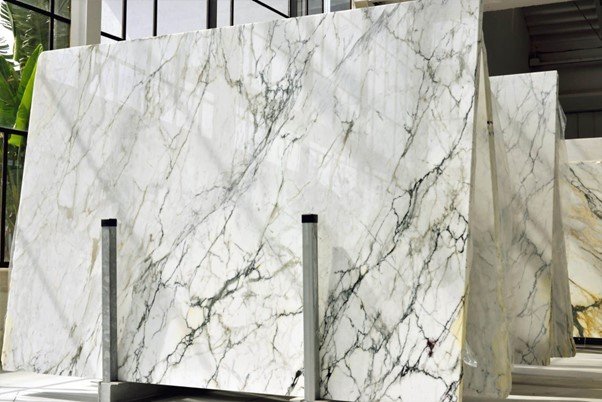Introduction
When it comes to home renovations and interior design, homeowners are always on the lookout for materials that are both stylish and durable. One popular option that has stood the test of time is the use of natural stone slabs. With a wide range of stone types and finishes available, it’s easy to see why they’ve remained a top choice for homeowners and designers alike.
In this comprehensive guide, we will delve into the world of natural stone slabs, exploring the various types available, their benefits, and how to choose the perfect stone for your home. So, let’s get started – and discover why natural stone slabs are the ultimate investment for your home.
Beauty of Natural Stone Slabs
1. Types of Natural Stone Slabs
a. Granite: Granite is a popular choice for countertops, flooring, and backsplashes due to its durability and resistance to stains, scratches, and heat. Granite is an igneous rock, formed from the slow cooling of magma, which results in a coarse-grained texture and a wide range of colors and patterns.
b. Marble: Marble is a metamorphic rock, formed from the recrystallization of limestone under heat and pressure. Known for its elegant veining and luxurious appeal, marble is commonly used for countertops, flooring, and wall cladding. However, it’s important to note that marble is more susceptible to staining, scratching, and etching compared to other natural stone options.
c. Travertine: Travertine is a type of limestone, formed in hot springs and limestone caves. It features a distinctive, porous texture and is available in a variety of earthy tones. Travertine is commonly used for flooring, wall cladding, and pool decking, but it requires regular sealing to prevent staining.
d. Limestone: Limestone is a sedimentary rock, composed primarily of calcite and aragonite. It offers a warm, natural appearance and is often used for flooring, wall cladding, and fireplace surrounds. Like travertine, limestone requires regular sealing to maintain its appearance and prevent staining.
e. Soapstone: Soapstone is a metamorphic rock, composed primarily of talc, which gives it a soft, soapy feel. It is nonporous, heat-resistant, and impervious to stains, making it an excellent choice for countertops, especially in kitchens. Its unique appearance and low-maintenance properties make soapstone an increasingly popular choice for homeowners.
f. Onyx: Onyx is a type of chalcedony, a form of microcrystalline quartz. It is known for its striking bands of color, often translucent, making it a popular choice for backlit applications, such as backsplashes, countertops, and feature walls. It’s important to note that onyx is more fragile than other natural stone options, requiring extra care and regular sealing.
g. Quartzite: Quartzite is a metamorphic rock, formed from the recrystallization of sandstone under heat and pressure. It is highly durable, heat-resistant, and low-maintenance, making it an excellent choice for countertops and flooring. Quartzite is available in a range of colors and patterns, often resembling the veining of marble.
2. Benefits of Natural Stone Slabs
a. Durability
Natural stone slabs are incredibly durable, with many types resistant to heat, stains, and scratches. When properly installed and maintained, natural stone features can last for decades, making them a smart investment for your home.
b. Unique Aesthetics
Each natural stone slab is unique, with variations in color, pattern, and texture. This means that no two installations will be exactly alike, providing your home with a one-of-a-kind design element.
c. Low Maintenance
Many types of natural stone slabs require minimal maintenance, with some being nonporous and resistant to staining. Regular cleaning and occasional sealing are often all that’s needed to keep your stone looking its best.
d. Added Home Value
Incorporating natural stone slabs into your home’s design can increase its value, as potential buyers are often attracted to the timeless beauty and durability that stone offers.
e. Eco-Friendly
Natural stone slabs are a sustainable, eco-friendly option, as they are sourced directly from the earth and require minimal processing. Additionally, they have a long lifespan and can often be recycled or repurposed, reducing their overall environmental impact.
3. Choosing the Perfect Natural Stone Slab for Your Home
a. Consider Your Home’s Style: When selecting a natural stone slab, it’s essential to consider your home’s overall style and design. Choose a stone that complements your existing color scheme and architectural features.
b. Determine Your Budget: Natural stone slabs can vary in price, so it’s important to establish a budget before shopping. Keep in mind that more exotic stones or intricate patterns may come with a higher price tag.
c. Assess the Required Maintenance: As previously mentioned, different types of natural stone slabs require varying levels of maintenance. Be sure to research the specific care requirements for the stone you’re interested in and determine whether it’s a good fit for your lifestyle.
d. Visit a Stone Showroom: Visiting a stone showroom can provide you with the opportunity to see and touch various types of natural stone slabs in person. This hands-on experience can help you make an informed decision about the best stone for your home.
Conclusion
Whether you’re remodeling your kitchen, updating your bathroom, or adding a luxurious touch to your living space, natural stone slabs are a smart investment for your home. Their durability, unique aesthetics, and low-maintenance properties make them an ideal choice for various applications. By carefully considering your home’s style, budget, and the required maintenance, you can select the perfect natural stone slab to elevate your home’s design and add lasting value.



